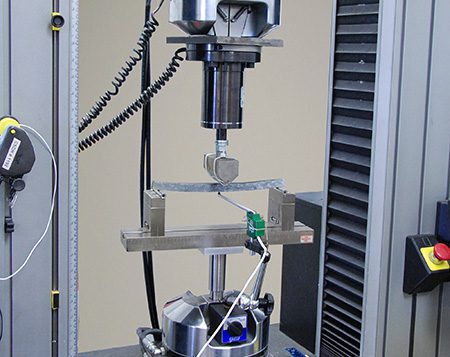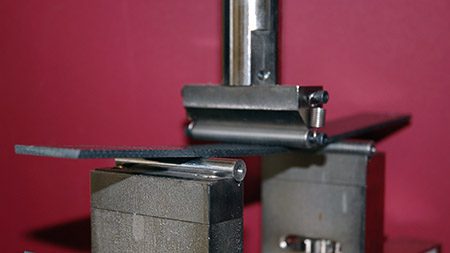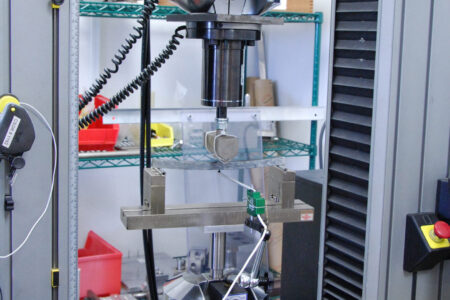Flexural Strength Testing for Non-Metallics
FLEXURAL STRENGTH TESTING (BEND TEST)
Flexural testing, also known as bend testing, is a mechanical testing method used to determine the behavior and properties of materials when subjected to bending loads. It involves applying a three-point or four-point bending load to a specimen until it fractures or deforms and measuring the resulting deflection and/or applied load.
Flexural testing is widely used to characterize the mechanical properties of materials such as metals, composites, ceramics, plastics, and concrete. It provides important information about a material's ability to withstand bending loads, its stiffness, strength, and toughness, which are essential for design and engineering applications in aerospace, automotive, construction, and materials science.
If you're interested in exploring IMR's flexural testing capabilities, click on the button below.
TYPES OF FLEXURAL TESTS
Three-Point Flexural Test
Flexural testing, also known as bend testing, is a mechanical testing method used to determine the behavior and properties of materials when subjected to bending loads. It involves applying a three-point or four-point bending load to a specimen until it fractures or deforms and measuring the resulting deflection and/or applied load.
Flexural testing is widely used to characterize the mechanical properties of materials such as metals, composites, ceramics, plastics, and concrete. It provides important information about a material's ability to withstand bending loads, its stiffness, strength, and toughness, which are essential for design and engineering applications in aerospace, automotive, construction, and materials science.
Four-Point Flexural Test
In a four point flexural test, the specimen is supported at its two ends and loaded at two points in between. This method is commonly used for materials that are stiffer or when more precise results are required.



MECHANICAL TESTING METHODS
Bend Testing
Bond Strength Testing
Charpy Impact Testing (-320°F to 450°F)
Climbing Drum Adhesion of Sandwich Composites
Coating Adhesion
Coating Shear Fatigue
Coefficient of Thermal Expansion by TMA
Composite Testing (Fiber Reinforced)
Compression Set
Compressive Properties
Core Shear Properties of Sandwich Construction by Beam Flexure
Creep and Stress Rupture Testing
DMA (Dynamic Mechanical Analyzer)
Ductility
Elastic Modulus
Fatigue Testing
Filled Hole Tension & Compression
Flattening
Flat-wise Tensile Testing
Flexural Properties
Floating Roller Peel Strength
Fracture Mechanics
Gel Time
Hardness (Rockwell, Brinell, Durometer, Shore, Barcol, Knoop, Vickers, Macro Vickers)
Heat Aging
Heat Deflection by TMA
Heat Treatment (furnace to 2100°F)
Hydrogen Embrittlement
Hydrostatic Pressure
Interlaminar Shear
Jominy Hardenability
Lap Shear Testing
Machining & Specimen Preparation
Materialography
Modulus of Rupture (MOR)
n-Value (Strain Hardening Exponent)
Open Hole Tension and Compression
Pipeline Integrity Testing
r-Value (Plastic Strain Ratio)
Residual Strength of Composites After Impact
Rotating Beam Fatigue
Shear Testing of Rivets to ASTM B565, Single/Double
Short Beam Strength
Shot Peen Qualification
Single-Edged Notched beams (SENB)
Slow Strain Rate (G129)
Specimen Conditioning
Strain Gaging
Surface Roughness (ANSI/ASME B46.1)
T Peel Strength
Tear Resistance of Films & Sheeting
Tear - Rubbers & Elastomers
Tensile Testing
Torsional and Axial Fatigue (200 lb)
Tube Testing (Tensile, Flare, Hydrostatic)
Welder & Procedure Qualification
Wire/Spring Testing (Wrap, Coil, Bend)
Young's, Tangent and Chord Modulus (Room Temperature)
RELATED FLEXURAL STRENGTH TESTING STANDARDS
- ASTM D 2344 (short beam shear)
- ASTM D 790
- ASTM C 393 Sandwich flex
- ASTM D 7264 (PMC flex)
RELEVANT ACCREDITATIONS
Click here for a complete list of accreditations and certifications for all IMR Test Labs locations.


